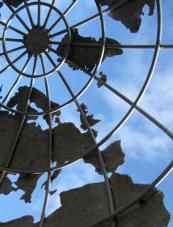Titles/abstracts (maximum 400 words) are to be sent to Beate Trandem by March 1 2011.
Ideas
As a starting point for this conference we want to suggest an alternative approach to the concept and the discourse of “globalization”. Irrespective of both normative issues and conflicting temporal scales we take globalization to mean the emergence, appearance and/or production of the world as an object of human experience and practice. The aim of the conference is to study how different sets of concepts, representations and methodologies, within different languages, disciplines, discourses or cultures, react and contribute to this emergence.
In contrast to “globalization”, which tends to point at an endless process, both in time and in space, in symmetry with other older concepts such as “progress” or “modernization”, the concept “world”, and even more “globe” or “earth” refer to something limited, finite and absolute. One of the paradoxes to be explored by this conference is how the complex, heterogeneous and infinite dynamics of globalization gives rise to the idea and reality of a limited, finite – and thus vulnerable – world.
In a dissertation from 1770 Kant defines the world as “the whole, which is not a part”. This totalitas absoluta enjoys “an ordinary and harmless comprehensibility”, he claims, as long as it remains within the borders of ordinary language, but is a “cross” for the philosophers. In the same year James Cook discovered and charted the Eastern coastline of Terra Australis Incognita, thus filling in one of the last blank spots in Western cartography and at the same time laying the world open for centuries of exploitation at the hands of merchants, politicians and adventurers. Both events, though very different in scope, made the world emerge as something finite and limited, but at the same time served as starting points for the infinite dynamics of globalization
Aims
This conference aims to study the emergence of the world in discourse, and its confrontation with different empirical and historical realities, both diachronically, across the centuries, and synchronically, across different cultures, languages and discourses. On a general level there will be three main areas of investigation:
- the world across languages and cultures – investigating how different languages meet or have met the semiotic challenges posed by globalization. The goal is explore what kind of semantic resources words and concepts, different languages have employed in conceptualizing and representing the world in different historical, cultural and social contexts, and how these linguistic strategies are linked to contrasting and overlapping processes of cultural transformation.
- the world across discourses and disciplines – exploring the most central and important concepts and methodologies dealing with the emergence of the world within different discourses and disciplines. How are they defined, and how are they used? In a second step we will look at how these discourses, concepts and methodologies are linked with institutions, policies and economic and political hegemonies.
- the world across media and materialities – focusing on the wide range of practices, media and material culture at work in conceptualizing the world in different periods and in different cultural contexts, such as travels, discoveries, maps, globes, timelines, paintings and photos as well as world atlases and world exhibitions. At the same time we want to target the scientific practices, tools and practical skills necessary to approach the world as a scientific object, observe it and measure it.
However, these three areas of investigation should be taken as suggestions and as sources of inspiration, not as straightjackets. It should not be the goal of the sessions at this conference to remain within the boundaries of any one of these areas – neither should it be the goal of the various papers making up these sessions. On the contrary, we will strive at organizing sessions which include perspectives from all areas of investigation.
Possible session topics could be world heritage, world society, global catastrophes, world time, Weltrecht, world literature, encyclopedias, cosmopolitanism, first, second and third world, global history, the world in religious and secular discourse, the world as political legitimacy, the scale of worlds, global ethnography, world music, world maps etc.
One common interest of all these sessions should be to explore how a discursive, cultural and/or historical contextualization of concepts, representations, methodologies, practices and institutions dealing with the world could help us in understanding their social and political implications – at a moment in history when there is a ever-growing conflict between unlimited and infinite globalization and a limited and finite world.

Photo: jk_scotland CC